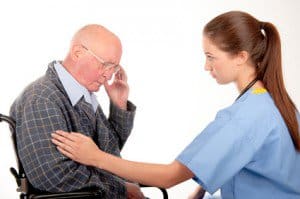
Medical Alert Systems are for those who are elderly, disabled, caring for small children, or recovering from a surgery.
While we often think of medical alert systems as items for the elderly, this is not necessarily the case. There are actually individuals of all ages who could greatly benefit from having a medical alert system. Read our Medical Guardian reviews for a full product list. These systems can be extremely useful to anyone:
- Who lives alone or spends many hours of the day alone at home
- With a serious medical condition such as chronic heart failure or diabetes
- With physical difficulties requiring the use of a cane, walker, or wheelchair
- Who is recovering from a recent surgery
- Who is taking a medication that has dizziness as a side effect
- Who is bedridden due to a difficult pregnancy
- Who works in a solitary work environment
- With young children who are watched by babysitters in the home
In all of these cases and more, having a medical alert system will afford you the peace of mind that medical assistance can be easily obtained 24 hours a day, 7 days a week, in the event of an emergency. By simply pressing a button worn around the neck or wrist, you will instantly reach a call center who will contact your family and first responders, as needed, to get you the help you need.
Another feature of medical alert systems that caregivers for seniors in particular may find useful, is called activity monitoring. There are two different ways this can be approached. With the first method, the base unit of your medical alert system will make a beeping noise, and cause the unit’s light flash. These serve as reminders for you to press the button on your base unit. If you do not press the button, the system will alert you with more beeping. After a specified amount of time has passed, if you continue to not press the button, personnel at the monitoring center will be alerted that something may be wrong.
The second method requires that motion detectors and contacts be placed around your home on doors and in hallways to readily travel. As you go about your daily activities, these detectors will note your presence in different rooms in your home. If the detectors do not sense motion within a certain time frame, your base unit will make a beeping sound, alerting you to move about or press the button on the unit. If there is no action within a specified period, the monitoring center will be alerted. Regardless of the method you choose, activity monitoring can provide extra reassurance that someone is always looking out for you.


